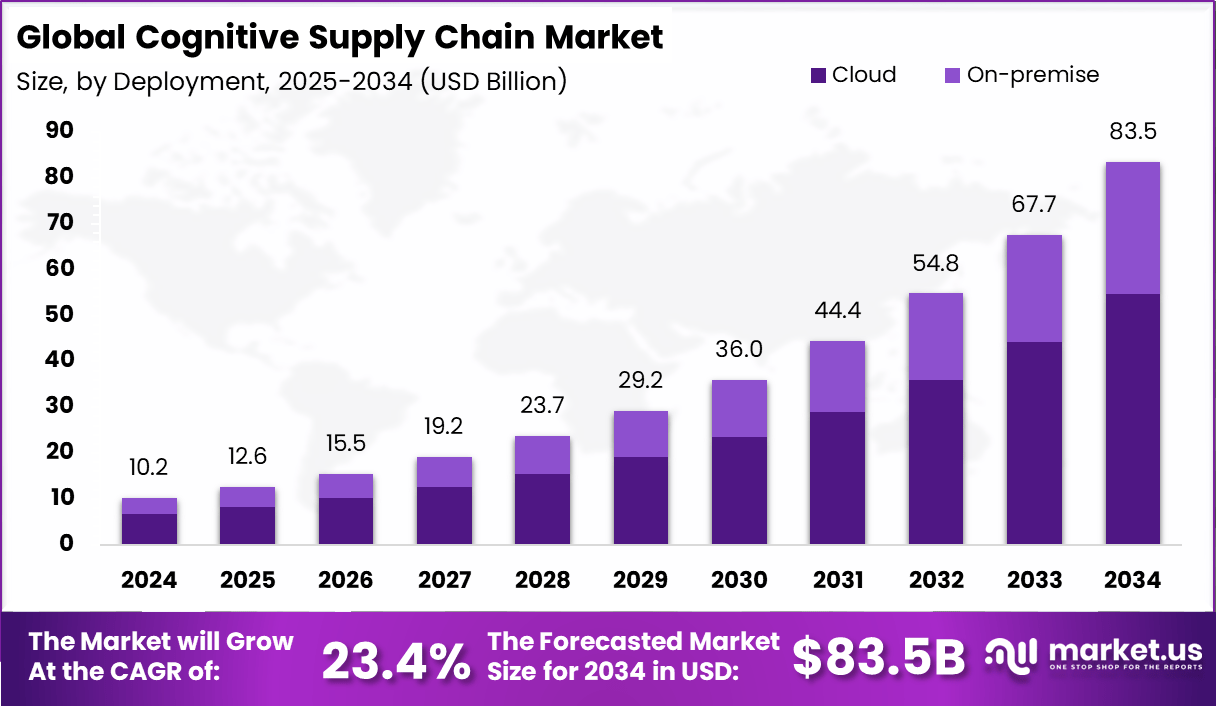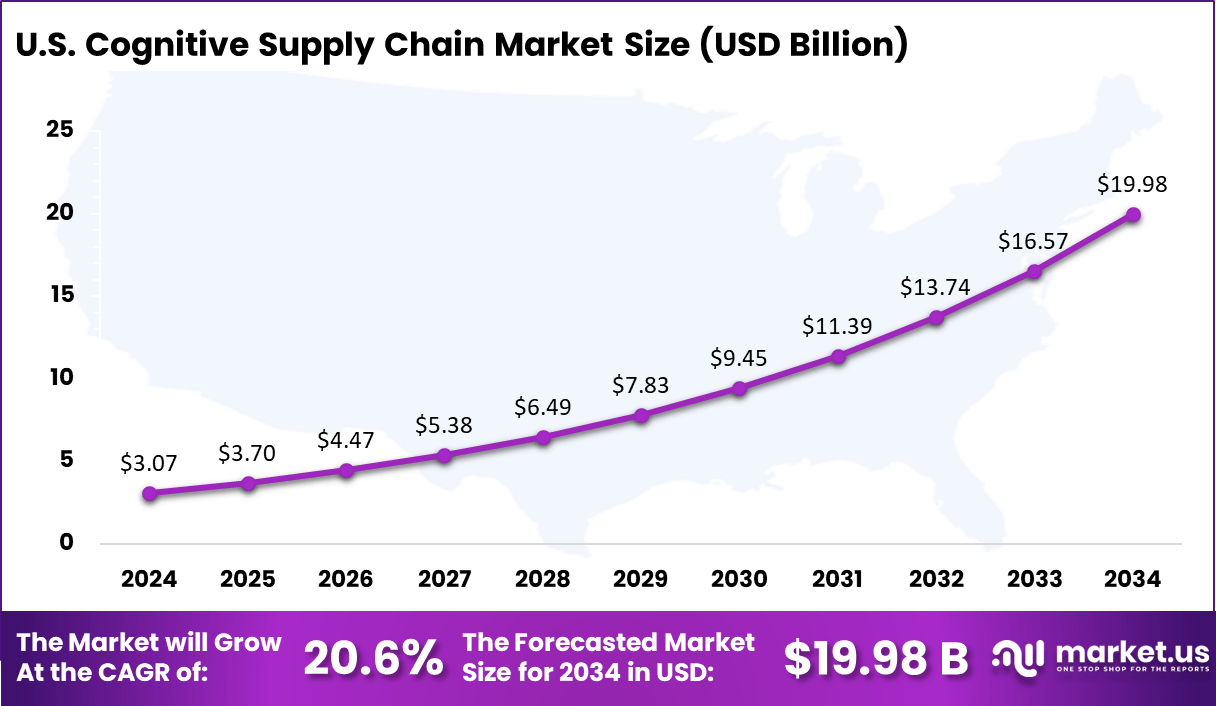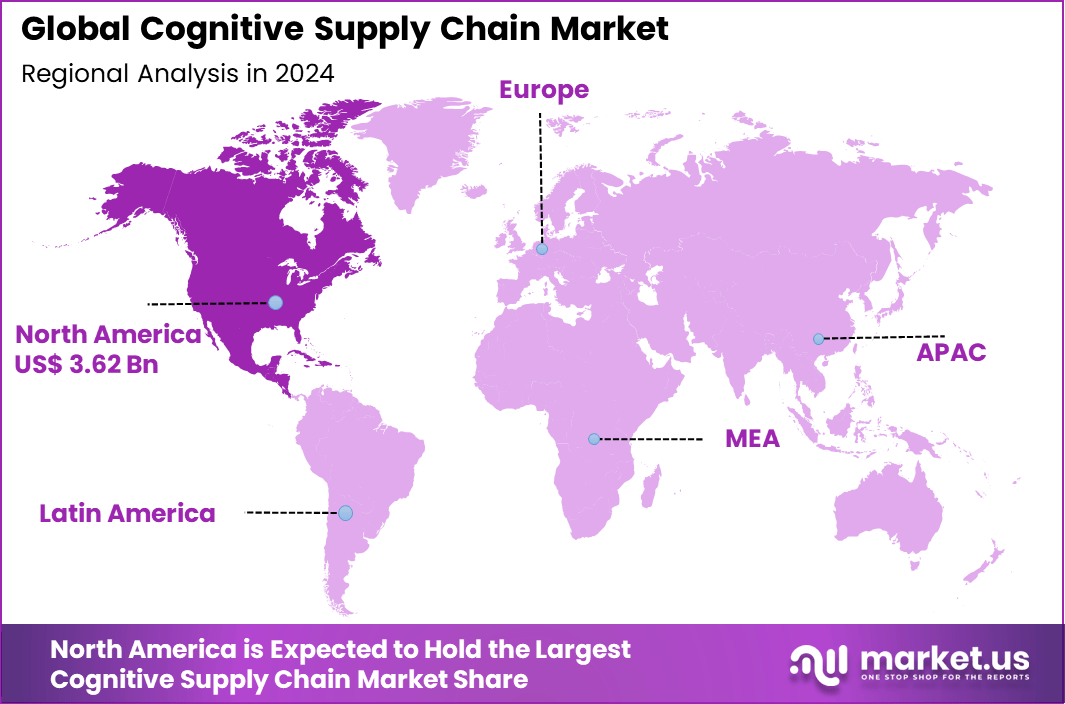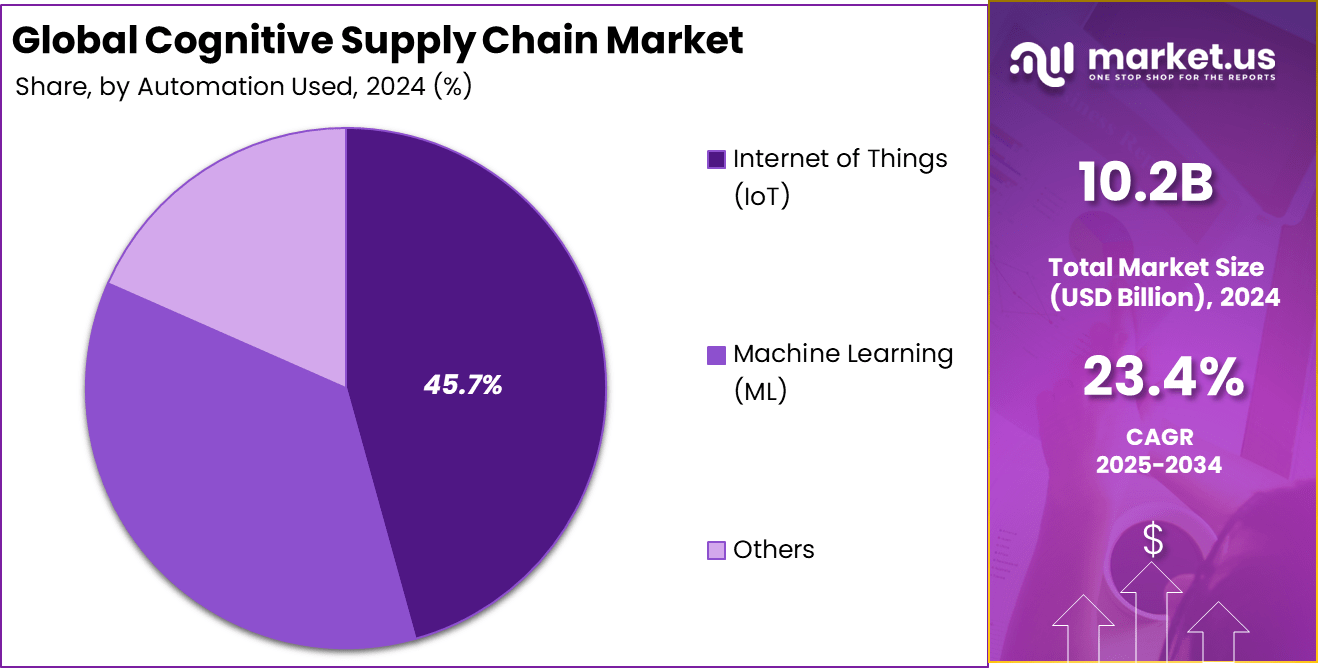Global Cognitive Supply Chain Market Size, Share Analysis Report By Deployment (Cloud, and On-premise), By Enterprise Size (SMEs, and Large Enterprise), By Automation Used (Internet of Things (IoT), Machine Learning (ML), and Others), By Industry Verticals (Manufacturing, Retail & E-commerce, Logistics and Transportation, Healthcare, Food and Beverage, & Others), By Region and Companies - Industry Segment Outlook, Market Assessment, Competition Scenario, Trends and Forecast 2025-2034
- Published date: July 2025
- Report ID: 154065
- Number of Pages: 223
- Format:
-
keyboard_arrow_up
Quick Navigation
Report Overview
The global Cognitive Supply Chain market size accounted for USD 10.20 billion in 2024 and is predicted to increase from USD 12.60 billion in 2025 to approximately USD 83.50 billion by 2034, expanding at a CAGR of 23.40% from 2025 to 2034. In 2024, North America held a dominant market position, capturing more than a 35.5% share, holding USD 3.62 Billion revenue.
A cognitive supply chain refers to a self‑learning logistics network in which artificial intelligence, ML and advanced analytics are integrated into each stage of supply chain operations. It continually learns from real‑time data sourced from IoT sensors, market trends and internal systems to predict disruptions, optimize inventory and support decision‑making. This innovation goes beyond traditional automation by adding smart, adaptive features to procurement, production, transport, and delivery systems.

One of the top driving factors for the cognitive supply chain market is the need for better visibility and control across end-to-end operations. Rising global trade complexity, frequent disruptions, and unpredictable demand require more than simply reacting to problems. Companies want to predict issues before they arise and act swiftly to overcome obstacles.
Cognitive supply chain platforms help organizations by offering predictive insights and enhanced automation, allowing them to manage resources and logistics with much greater agility. Demand for cognitive supply chain technologies has soared in recent years as supply chain interruptions and rising consumer expectations have pushed organizations to find smarter solutions.
For instance, In October 2023, AI startup Altana launched Atlas, a real-time supply chain visibility tool. Designed for businesses, governments, and logistics providers, Atlas offers a dynamic map that delivers actionable insights, boosts efficiency, and supports faster responses to supply chain disruptions.
Companies are realizing that manual and legacy systems simply cannot keep up with today’s pace of change. A growing appetite for real-time, data-driven decisions is propelling businesses to invest in these systems. The demand is particularly strong in industries such as retail, automotive, and manufacturing, where even small improvements in efficiency can yield significant cost savings and competitive advantages.
Market Size and Growth
Report Features Description Market Value (2024) USD 10.2 Bn Forecast Revenue (2034) USD 83.5 Bn CAGR(2025-2034) 23.4% Leading Segment Large Enterprise – 74.5% Largest Market North America [35.5% Market Share] Largest Country US: USD 3.07 Billion Market Revenue, CAGR: 20.6% Key Takeaways
- In 2024, the On-premise deployment segment led with a 65.4% share, favored by organizations prioritizing data control, security, and system integration flexibility.
- Large Enterprises held a commanding 74.5% share of the market, driven by complex global operations and the need for scalable cognitive solutions.
- The Internet of Things (IoT) technology segment led with a 45.7% share, as connected devices enable predictive analytics and real-time inventory visibility.
- Manufacturing emerged as the top industry, accounting for 34.8%, fueled by automation, digital twin adoption, and production cycle optimization.
- The US market reached USD 3.07 Billion in 2024, showing consistent growth supported by a CAGR of 20.6%, with strong digitalization initiatives across supply chain networks.
- North America led globally with a 35.5% market share, driven by early technology adoption, advanced logistics infrastructure, and a high concentration of global enterprises.
AI Impact
The integration of artificial intelligence into cognitive supply chain systems is being deployed with increasing sophistication. This paradigm shift supports the emergence of self‑learning networks that adapt in real time through machine learning, natural language processing, and advanced analytics.
The cognitive supply chain has been designed to generate actionable insights from diverse data sources such as sensor feeds, ERP systems, market signals, and weather patterns to support decision‑making and automated response mechanisms. The benefits offered by cognitive supply chain implementations have been well documented.
Forecast accuracy is significantly enhanced, enabling more precise demand planning and inventory replenishment. Operational agility is improved through automated workflows that free human operators from routine tasks. Real‑time visibility of inventory and logistics operations supports rapid identification of risks such as delays or disruption, and appropriate mitigation responses are triggered more swiftly.
U.S. Market Size Statistics
The US Cognitive Supply Chain Market was valued at USD 3.07 Billion in 2024, with a robust CAGR of 20.6%. The US cognitive supply chain market is growing rapidly, inspired by technological progress in Artificial Intelligence (AI), Machine Learning and Internet of Things (IOT). Cognitive supply chain takes advantage of these techniques to enhance operating efficiency, improve inventory management and adapt decisions processes.
By integrating the future stating analytics and real -time data processing, businesses can predict better demand, manage risks and respond to supply chain disruptions. These development industries are changing industries such as manufacturing, retail and logistics, making companies capable of being competitive in the fast -moving global market.
The emergence of automation and data-operating insight is to streamline operations, reduce costs and increase supply chain visibility. With continuous innovation in AI and Analytics, the U.S. Cognitive supply chain is leading in -charge in adopting chain technologies, contributing to more flexible and responsible supply chains.

In 2024, North America held a dominant market position in the global Cognitive Supply Chain Market, capturing more than a 32.7% share. The North America cognitive supply chain market is witnessing the rapid development of AI, machine learning and automation tools. The sector businesses, especially in manufacturing and retail, are adopting these techniques to increase supply chain efficiency and get competitive benefits.
Cognitive supply chains enable future stating analysis, improving inventory management, demand forecast and risk mitigation. Additionally, integration of Internet of Things (IOT) devices allows for real -time data processing and better supply chain visibility. A major trend in the region is scalable, increasing dependence on cloud-based cognitive solutions for cost-skilled operations.
In addition, companies are focusing on automation and AI-managed insights to customize workflows and reduce human intervention in regular tasks. The expansion of smart logistics and AI-operated adaptation supports market growth by improving the agility and accountability of supply chains in North America.

Deployment Analysis
In 2024, the On-premise segment held a dominant market position, capturing more than a 65.4% share of the Global Cognitive Supply Chain Market. On-premise solutions offer enhanced security, data control, and customization, making them especially appealing for large enterprises with complex supply chain operations and stringent data privacy requirements.
Many companies in regulated industries, such as finance and healthcare, prefer on-premise deployments to ensure full control over sensitive data and meet compliance standards. Additionally, on-premise systems enable businesses to integrate cognitive supply chain technologies with their existing infrastructure, providing more flexibility and scalability.
Another reason for on-premise dominance is the ability to handle large volumes of data without relying on external servers or cloud services, which is crucial for businesses with high data processing needs. Although cloud-based solutions are gaining traction due to cost-effectiveness and scalability, the need for strict security and data governance continues to keep on-premise solutions in a leading position in many sectors.
Enterprise Size Analysis
In 2024, the Large Enterprise segment held a dominant market position, capturing more than a 74.5% share of the Global Cognitive Supply Chain Market. This is due to the complex, high-volume operations and the need for sophisticated, AI-driven supply chain management solutions.
Large enterprises often have extensive global networks and diverse supply chain operations, which require advanced technologies to maintain efficiency, reduce costs, and ensure smooth coordination across different regions. Cognitive supply chains, powered by AI, machine learning, and automation, enable large enterprises to optimize their processes with predictive analytics, real-time data, and demand forecasting.
The significant investment capacity of large enterprises enables them to integrate these cutting-edge solutions, driving adoption. These companies are also increasingly looking for ways to enhance their competitiveness by leveraging automation, real-time insights, and optimization technologies. With greater resources to deploy cognitive solutions at scale, large enterprises can streamline their supply chains and improve decision-making, ensuring resilience and agility in dynamic market conditions.
Automation Used Analysis
In 2024, the Internet of Things (IoT) segment held a dominant market position, capturing more than a 26.7% share of the Global Cognitive Supply Chain Market, due to its ability to enable real-time monitoring and enhance supply chain visibility. IoT devices collect vast amounts of data from various sources such as sensors, RFID tags, and GPS trackers embedded in products, equipment, and transportation vehicles.
This data is then analyzed using advanced cognitive tools like AI and machine learning to provide actionable insights for decision-making. The dominance of IoT stems from its capacity to deliver end-to-end supply chain visibility, enabling businesses to track inventory, optimize routes, and predict maintenance needs before issues arise.
As a result, IoT enhances operational efficiency, reduces downtime, and improves overall supply chain performance. Moreover, with the increasing need for real-time data processing, IoT’s role in enabling faster decision-making and ensuring the agility of supply chains further strengthens its leading position in the market.

By Industry Vertical Analysis
In 2024, the Manufacturing segment held a dominant market position, capturing more than a 34.8% share of the Global Cognitive Supply Chain Market, due to the increasing complexity and scale of operations within this sector.
Manufacturing companies, especially those in industries such as automotive, electronics, and industrial equipment, heavily rely on cognitive technologies to streamline their supply chains. These technologies – such as AI, machine learning, and data analytics – help manufacturers predict demand, optimize inventory, and improve production scheduling.
Cognitive systems also enable real-time monitoring and predictive maintenance, reducing downtime and enhancing operational efficiency. Manufacturers are also leveraging cognitive technologies to optimize their global supply chains, ensuring the smooth movement of raw materials, components, and finished goods across borders.
The integration of IoT and big data analytics allows manufacturers to make data-driven decisions, respond quickly to disruptions, and manage complex logistics. As global supply chains become more interconnected and data-driven, cognitive supply chain solutions are key enablers for manufacturers seeking to remain competitive and agile in a rapidly changing market.
Growth Factors
Growth Factor Description Adoption of AI, ML, and IoT Businesses are using artificial intelligence, machine learning, and Internet of Things to improve supply chain efficiency and decision-making. These technologies allow automation and smarter operations. Predictive Analytics and Demand Forecasting Cognitive tools help companies predict market demand, optimize inventory, and reduce waste by analyzing large amounts of data in real time. Advanced Analytics & Big Data Integration With more data generated from sensors and devices, companies can respond faster to changes and gain valuable insights for supply chain management. Shift to Customer-Centric Operations Companies are using cognitive tech to improve customer experiences by making deliveries faster and more reliable. E-commerce and Global Trade Expansion More online sales and global trading require efficient, data-driven supply chains. Need for Cost Optimization Firms use cognitive systems to save money by reducing inventory costs, streamlining logistics, and improving resource allocation. Key Features and Trends
Key Feature / Trend Description Real-time Visibility Cognitive systems provide live updates on shipments and inventory for better decisions. Automation and Self-Optimization These systems learn from data to automatically improve supply chain operations. Integration of Blockchain and Edge Computing Using blockchain ensures secure data sharing, and edge computing allows immediate local decisions. Collaborative Human-AI Interfaces New solutions allow workers to interact more easily, with AI providing helpful suggestions and automation. Sustainability Analytics Tracking and reducing carbon footprint and energy waste is now a big focus. Predictive Maintenance and Risk Planning Companies can predict and prevent breakdowns, and plan for risks using real-time and historical data. Rapid AI and IoT Adoption More companies across industries are using AI and IoT for smarter, data-driven supply chains. Drivers
Advancements in Artificial Intelligence and Machine Learning
The integration of Artificial Intelligence (AI) and Machine Learning (ML) into the cognitive supply chain market is driving significant advancements, enabling companies to enhance efficiency, predictive capabilities, and decision-making. AI and ML algorithms enable real-time analytics, predictive modeling, and smarter automation, helping businesses forecast demand, optimize inventory management, and improve customer experiences.
For instance, April 2025, Google Cloud announced an expanded multi-year partnership with Papa Johns to revolutionize the pizza maker’s ordering and delivery experience using the power of artificial intelligence (AI). Through the partnership Papa Johns has created an innovation team, named PJX, that will leverage Google Cloud’s AI, data analytics and ML capabilities to provide a more frictionless and consistent experience for customers both inside its restaurants and throughout its digital channels.
AI and ML enable predictive analytics, optimize real-time decision-making, and enhance supply chain automation. As more companies embrace AI-driven solutions, cognitive supply chains are becoming smarter, faster, and more resilient, thus helping organizations reduce operational costs, improve customer satisfaction, and gain a competitive edge. AI and ML advancements are boosting the cognitive supply chain market by helping businesses streamline operations and stay flexible in a changing global environment.
Restraint
Data Privacy and Security Concern
The deployment of cognitive supply chain systems is being constrained by significant concerns around data privacy and security. As platforms rely on extensive sharing and aggregation of data, businesses must ensure rigorous compliance with relevant regulations. This complexity can delay adoption and limit scaling initiatives.
Security vulnerabilities arising from cyberattacks or breaches within supplier ecosystems also represent a major restraint. Sensitive operational and transactional data may be exposed if robust protections are not implemented. Consequently some organizations remain cautious about entrusting mission‑critical functions to cognitive platforms without proven safeguards.
Opportunities
Automation of Routine Supply Chain Tasks
Automation is one of the most significant opportunities in the cognitive supply chain market. With the help of Robotic Process Automation (RPA) and AI, routine tasks such as order processing, invoice generation, and shipment tracking can be automated. This reduces human error, speeds up operations, and cuts down on operational costs.
By automating repetitive tasks, businesses can focus on more strategic activities, such as optimizing routes, improving supplier relationships, and enhancing customer experiences. As RPA technology evolves, its potential for streamlining supply chain operations will continue to grow, creating new opportunities for companies to improve their supply chain performance.
Key Market Segments
By Deployment
- Cloud
- On-premise
By Enterprise Size
- SMEs
- Large Enterprise
By Automation Used
- Internet of Things (IoT)
- Machine Learning (ML)
- Others
By Industry Verticals
- Manufacturing
- Retail & E-commerce
- Logistics and Transportation
- Healthcare
- Food and Beverage
- Others
Key Regions and Countries Covered in this Report
- North America
- The US
- Canada
- Europe
- Germany
- France
- The UK
- Spain
- Italy
- Russia
- Netherland
- Rest of Europe
- APAC
- China
- Japan
- South Korea
- India
- Australia & New Zealand
- ASEAN
- Rest of APAC
- Latin America
- Brazil
- Mexico
- Rest of Latin America
- Middle East & Africa
- GCC Countries
- South Africa
- Rest of MEA
Key Players Analysis
In the Cognitive Supply Chain Market, prominent players such as IBM Corporation, Oracle, and SAP SE have established strong positions by offering integrated AI and analytics platforms. These firms are leveraging advanced technologies to enable end-to-end supply chain visibility, predictive analytics, and cognitive automation. Their solutions help enterprises manage risks, optimize inventory, and streamline operations in real time.
Companies like Accenture plc, Intel Corporation, and NVIDIA Corporation are playing a vital role in shaping the future of cognitive supply chains through innovation in AI chipsets, digital twins, and cloud-based infrastructure. Their technologies are being used to build adaptive logistics networks and automate demand forecasting. These players are contributing significantly to real-time decision-making by combining deep learning models with high-performance computing, thereby enhancing agility and resilience in supply chain workflows.
In addition, firms such as Honeywell International Inc., C.H. Robinson Worldwide, Inc., and Panasonic are advancing cognitive logistics through robotics, IoT integration, and connected warehouse systems. These companies focus on real-time shipment tracking, supply chain orchestration, and automated fulfilment. Their industrial and operational technologies support smart warehousing and transportation systems.
Top Key Players in the Market
- IBM Corporation
- Oracle
- Amazon.com
- Accenture plc
- Intel Corporation
- NVIDIA Corporation
- Honeywell International Inc.
- H. Robinson Worldwide, Inc.
- Panasonic
- SAP SE
- Others
Recent Developments
- In April 2025, Bosch, a leading global supplier of technology and services announced the launch of its Supply Chain Studio, a cloud-based suite of tools aimed at enhancing supply chain efficiency and visibility.
- In January 2024, Blue Yonder introduced a major product update aimed at transforming supply chain performance through enhanced interoperability. This upgrade integrates the company’s cognitive platform with its proprietary data cloud to improve operational efficiency, reduce waste, and build stronger supply chain resilience.
- In January 2023, Accenture strengthened its position in digital supply chain innovation by acquiring Inspirage, a firm known for its deep expertise in Oracle Cloud applications. This strategic move allows Accenture to expand its offerings in supply chain transformation, particularly in adopting cutting-edge technologies like digital twins and touchless automation.
Report Scope
Report Features Description Base Year for Estimation 2024 Historic Period 2020-2023 Forecast Period 2025-2034 Report Coverage Revenue forecast, AI impact on market trends, Share Insights, Company ranking, competitive landscape, Recent Developments, Market Dynamics and Emerging Trends Segments Covered By Deployment (Cloud, and On-premise), By Enterprise Size (SMEs, and Large Enterprise), By Automation Used (Internet of Things (IoT), Machine Learning (ML), and Others), By Industry Verticals (Manufacturing, Retail & E-commerce, Logistics and Transportation, Healthcare, Food and Beverage, & Others), Region Regional Analysis North America – US, Canada; Europe – Germany, France, The UK, Spain, Italy, Russia, Netherlands, Rest of Europe; Asia Pacific – China, Japan, South Korea, India, New Zealand, Singapore, Thailand, Vietnam, Rest of Latin America; Latin America – Brazil, Mexico, Rest of Latin America; Middle East & Africa – South Africa, Saudi Arabia, UAE, Rest of MEA Competitive Landscape IBM Corporation, Oracle, Amazon.com, Accenture plc, Intel Corporation, NVIDIA Corporation, Honeywell International Inc., C.H. Robinson Worldwide, Inc., Panasonic, SAP SE., and Others Customization Scope Customization for segments, region/country-level will be provided. Moreover, additional customization can be done based on the requirements. Purchase Options We have three license to opt for: Single User License, Multi-User License (Up to 5 Users), Corporate Use License (Unlimited User and Printable PDF)  Cognitive Supply Chain MarketPublished date: July 2025add_shopping_cartBuy Now get_appDownload Sample
Cognitive Supply Chain MarketPublished date: July 2025add_shopping_cartBuy Now get_appDownload Sample -
-
- IBM Corporation
- Oracle
- Amazon.com
- Accenture plc
- Intel Corporation
- NVIDIA Corporation
- Honeywell International Inc.
- H. Robinson Worldwide, Inc.
- Panasonic
- SAP SE
- Others













